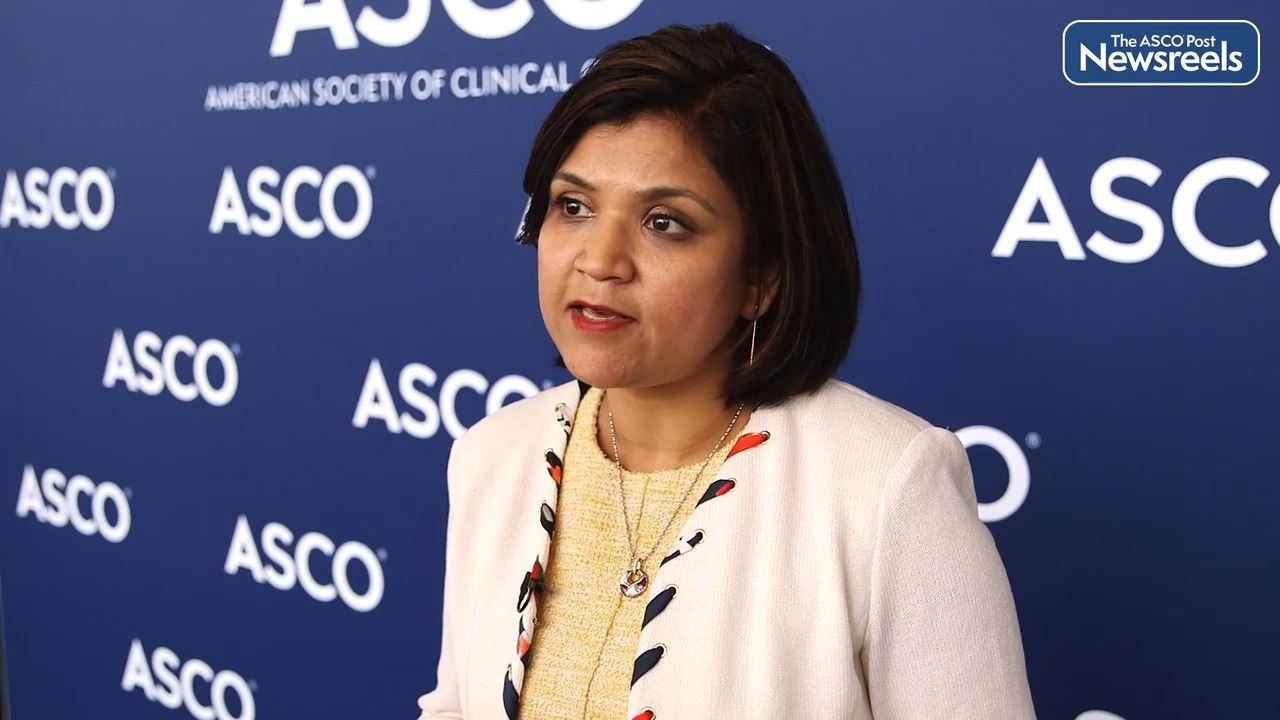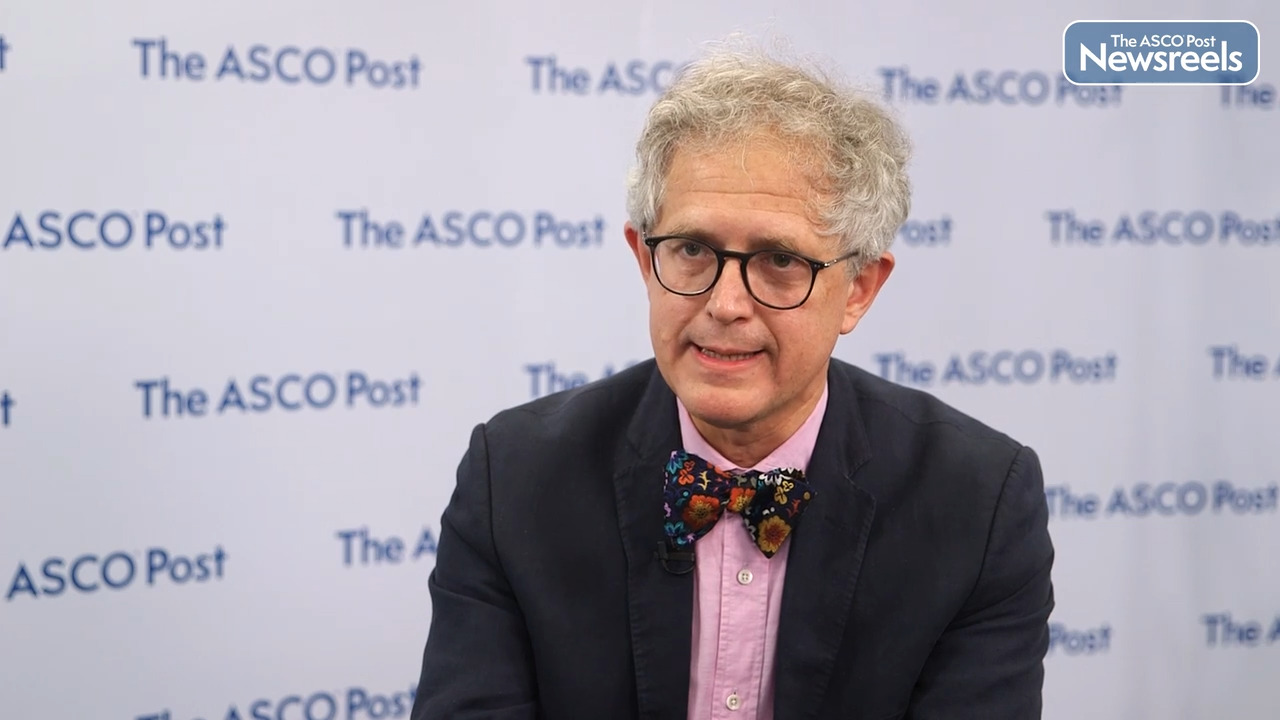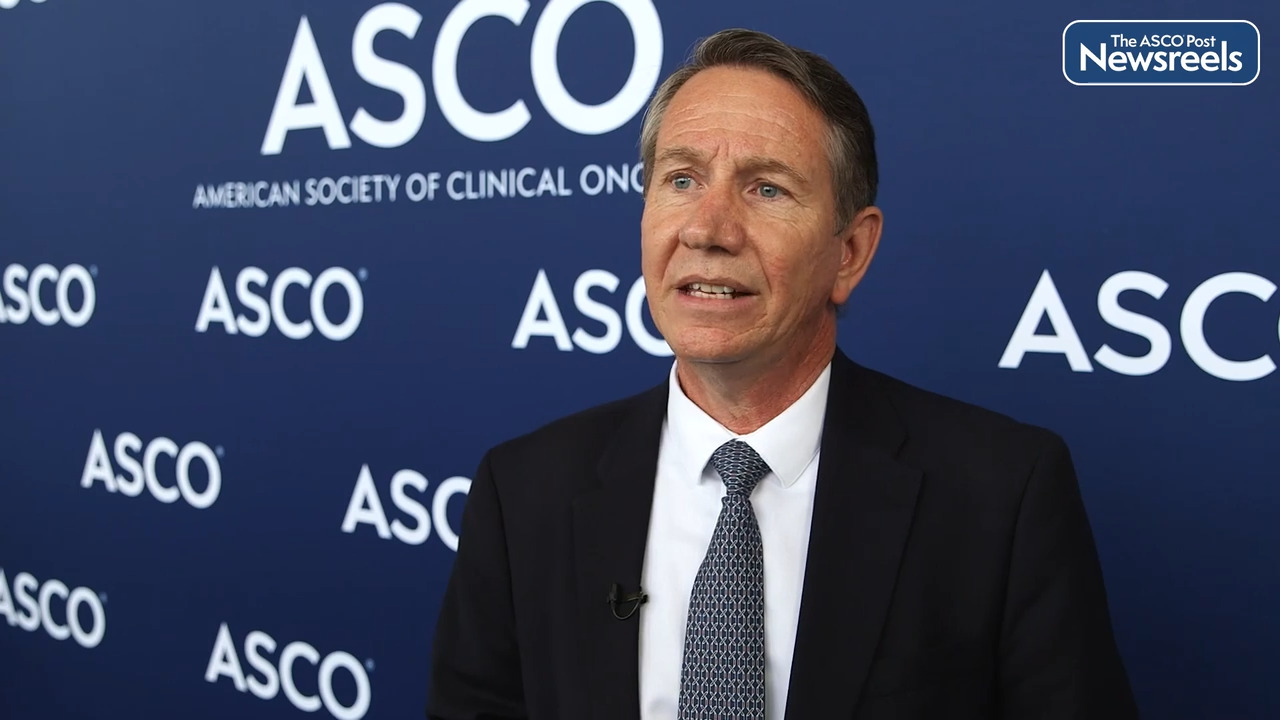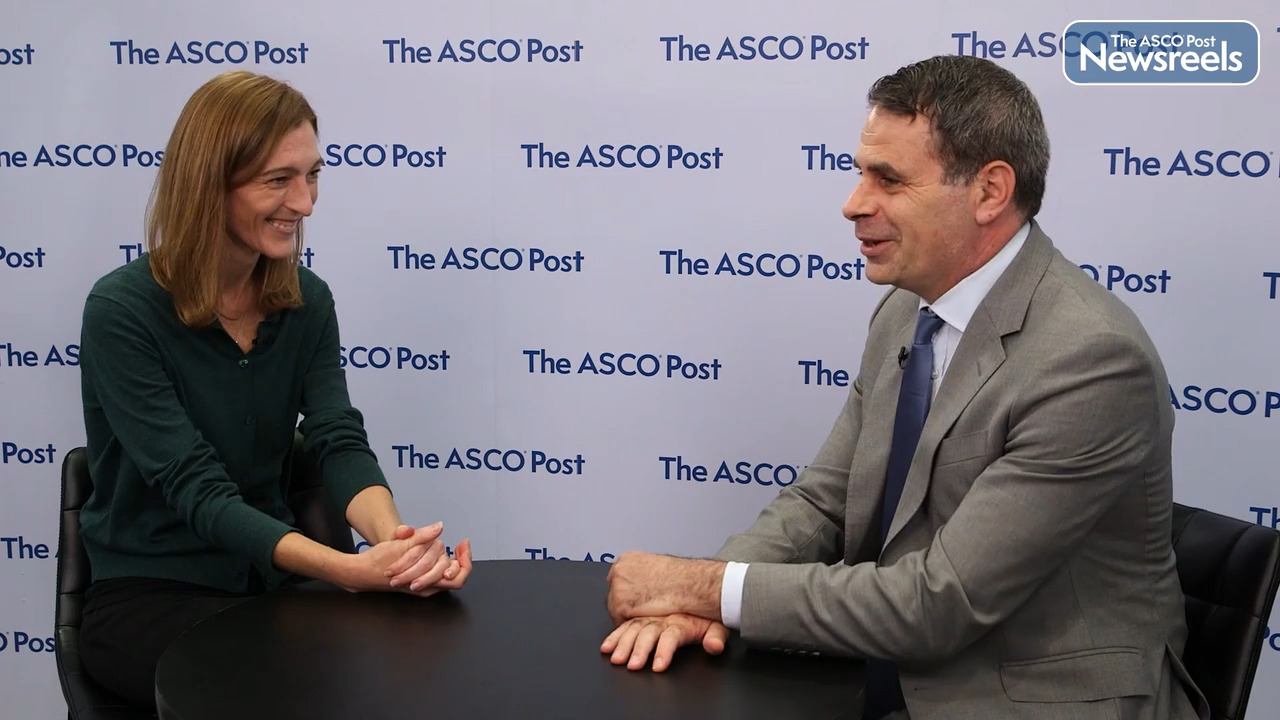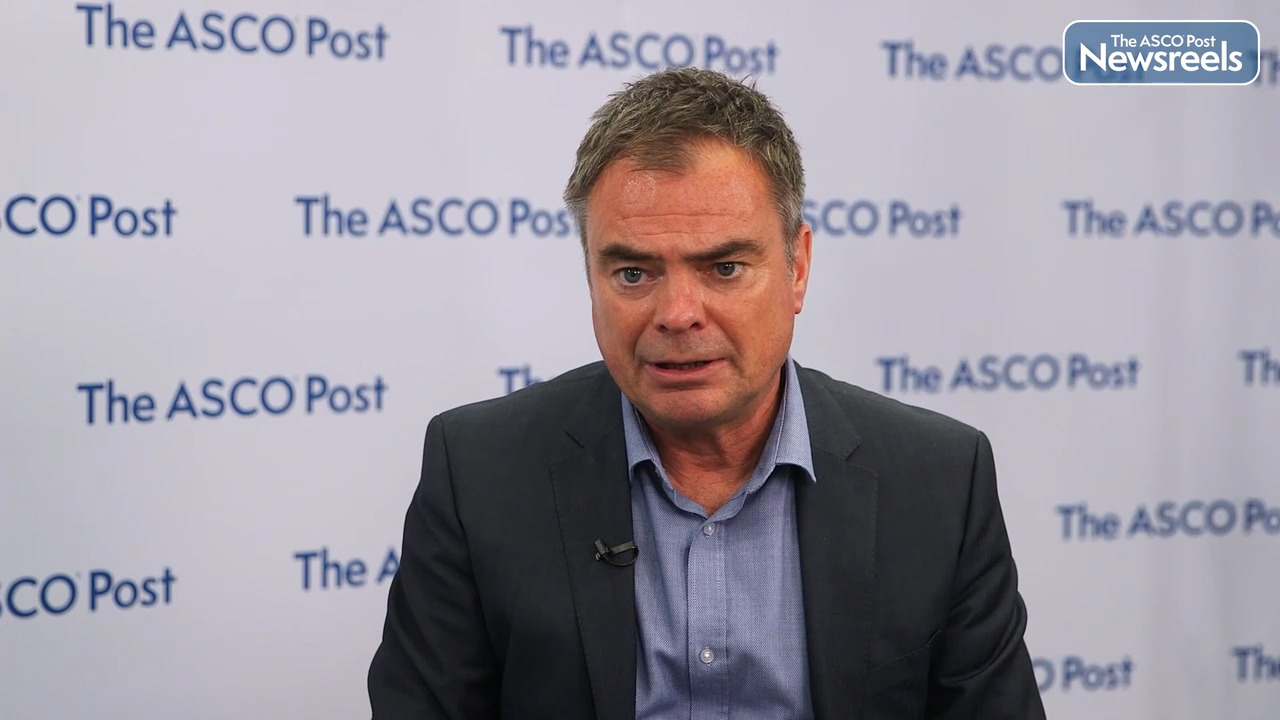Georgina V. Long, MD, PhD, on Melanoma: New Data on Pembrolizumab, Dabrafenib, and Trametinib
2022 ASCO Annual Meeting
Georgina V. Long, MD, PhD, of the Melanoma Institute Australia, The University of Sydney, discusses findings from the NeoTrio trial on neoadjuvant pembrolizumab alone, in sequence with, or concurrent with dabrafenib plus trametinib in patients with resectable BRAF-mutant stage III melanoma. The study may help clinicians determine the optimal combination of therapy (Abstract 9503).
Transcript
Disclaimer: This video transcript has not been proofread or edited and may contain errors.
The NeoTrio trial is one of the many neoadjuvant trials that we are now conducting in melanoma, in Resectable Stage III Melanoma. It is the most wonderful platform. Not only do we rapidly assess the efficacy of drug therapies, cutting drug development time from over two years to six months but we also get wonderful translational tumor tissue to then understand resistance, because this is the greatest unmet need in melanoma. So the NeoTrio trial was a neoadjuvant trial conducted in stage three resected melanoma. Patients were randomized to three different arms. The hypothesis in this trial was how do we best combine BRAF and MEK targeted therapy with anti-PD-1 immunotherapy? Should we give them all three together? Can we get away with just giving a little bit of the targeted therapy in sequence with the anti-PD-1? And this rationale is because we know that BRAF and MEK inhibitors bring in lots of T cells within one week of starting treatment. And then the third arm was a control arm of anti-PD-1 alone. We have previously conducted a neoadjuvant trial with just targeted therapy and that was the NeoCombi trial previously published in The Lancet Oncology, which forms the second control arm. So in this three arm trial, we saw that the complete pathological response rate was very different in the three arms. For the triple therapy of all three drugs together, it was 50% with the major pathological response rate of 55%. The major pathological response is the complete response plus the near complete response. For the sequencing arm, we did not see such a high level of pathological response and it was 15% for complete pathological response and 30% for major pathological response. For the PD-1 alone arm, we soar a 30% complete pathological response rate and a 40% major pathological response rate. So in summary for the pathological response, we saw the highest rate within the triple therapy arm and the lowest rate within the sequencing arm, which was unlikely to be any different from the PD-1 alone arm. In terms of the number of patients that were 20 patients in each arm because this is mainly a translational signal finding neoadjuvant trial. Now what's really important is the quality of these pathological response rates from a pooled analysis that we published in Nature Medicine, first author Alex Menzies, we saw that when you had a pathological response with immunotherapy, we saw a sustained relapse free survival benefit, almost a flat lining of the relapse free survival patients rarely recurred. With targeted therapy however, we see that if you have a pathological response, you can indeed recur. Although complete pathological responders do well with just targeted therapy, they still can recur unlike immunotherapy. Now, what we saw in this trial was that although we saw a higher pathological response rate with the triple therapy patients could recur. In fact, already we've had one recurrence from the major pathological responders and we've had no recurrences in the major pathological responses with PD-1 alone. So in short, this trial showed that sandwiching or sequencing the BRAF/MEK, did not provide that extra activity with the PD-1 that we were hoping for. And that in fact, immunotherapy still confers the greatest benefit in terms of correlating the relapse-free survival with the pathological response. We also saw significant toxicity with the triple therapy particularly pyrexia, driven by the Dabrafenib and Trametinib and enhanced by the PD-1, anti-PD-1 pembrolizumab. And we also saw many patients have to cease the BRAF and MEK inhibitor Dabrafenib and Trametinib during the neoadjuvant phase. The take home message is that giving a little bit of BRAF/MEK inhibitor before your PD-1 does really not change the long term outcome. Leveraging that T-cell infiltrate that BRAF and MEK inhibitors give, cannot be done in this way. And it's probably a nonspecific T-cell infiltrate that we see.
Related Videos
The ASCO Post Staff
Shilpa Gupta, MD, of the Cleveland Clinic Foundation, discusses an updated consensus definition for standard therapy and clinical trial eligibility for patients with metastatic urothelial cancer who are platinum-ineligible, criteria that are proposed to guide treatment recommendations for this population. This may be especially important now that the U.S. Food and Drug Administration has restricted the use of first-line pembrolizumab to those who are considered platinum-ineligible (Abstract 4577).
The ASCO Post Staff
Etienne Brain, MD, PhD, of the Institut Curie, discusses phase III findings from the Unicancer ASTER 70s trial, in which patients aged 70 or older with estrogen receptor–positive, HER2-negative breast cancer and a high genomic grade index received adjuvant endocrine therapy with or without chemotherapy. The data did not find a statistically significant overall survival benefit with this treatment after surgery (Abstract 500).
The ASCO Post Staff
Stephen M. Ansell, PhD, MD, of Mayo Clinic, discusses updated data from the ECHELON-1 trial, which showed that, when administered to patients with stage III or IV classical Hodgkin lymphoma, the combination of brentuximab vedotin, doxorubicin, vinblastine, and dacarbazine (A+AVD) vs doxorubicin, bleomycin, vinblastine, and dacarbazine resulted in a 41% reduction in the risk of death. These outcomes, says Dr. Ansell, confirm A+AVD as a preferred option for previously untreated disease (Abstract 7503).
The ASCO Post Staff
Courtney D. DiNardo, MD, MSCE, of The University of Texas MD Anderson Cancer Center, and Stéphane de Botton, MD, PhD, of Institut Gustave Roussy, discuss phase III findings from the IDHENTIFY trial, which showed that mutational burden and co-mutational profiles differed between patients with relapsed or refractory acute myeloid leukemia that exhibited IDH2-R140 and IDH2-R172 mutations. Enasidenib improved survival outcomes for patients with IDH2-R172 mutations: median overall survival and 1-year survival rates were approximately double those in the conventional care arm (Abstract 7005).
The ASCO Post Staff
Robert Hugh Jones, MD, PhD, of Cardiff University and Velindre Hospital, discusses results from an updated analysis of the FAKTION trial, which showed improved overall survival with fulvestrant plus capivasertib in women with metastatic estrogen receptor–positive breast cancer whose disease had relapsed or progressed on an aromatase inhibitor. The benefit may be predominantly in patients with PIK3CA/AKT1/PTEN pathway–altered tumors, a topic researchers continue to study in the phase III CAPItello-291 trial (Abstract 1005).
